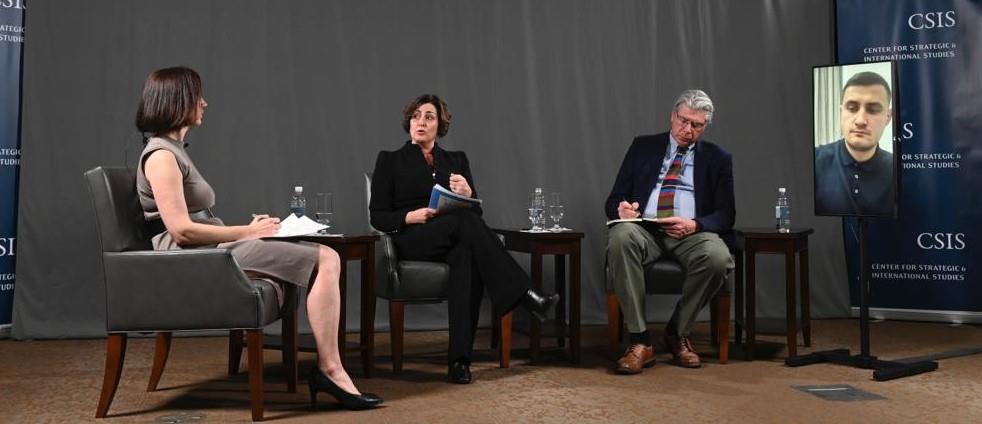Agriculture and Food Security: Casualties of the War in Ukraine

16 March 2021, Washington, D.C.- Concerns are rising over the repercussions of the war in Ukraine on global food security. At this critical time, the Center for Strategic and International Studies (CSIS) Global Food Security Program convened an expert panel to provide insights on the potential impact of the ongoing crisis, both within Ukraine and around the world.
The event, moderated by Caitlin Welsh, Director of the CSIS Global Food Security Program, featured Dozba Taras, Deputy Minister at the Ministry of Agrarian Policy and Food of Ukraine who joined virtually from Kyiv; Beth Bechdol, Deputy Director-General of the Food and Agriculture Organization of the United Nations (FAO); and Joe Glauber, Senior Fellow at the International Food Policy Research Institute (IFPRI).
“Ukraine and Russia are both global agricultural powerhouses accounting for a significant amount of the world’s exports of wheat, maize, oilseeds and fertilizers,” shared Welsh in her opening remarks, detailing how the Russian Federation and Ukraine conflict is affecting world trade in key commodities and the potential for supply chain disruptions, including among countries that are already in situations of food insecurity.
Bechdolidentified seven areas of risk due to the conflict: trade, food prices, logistics, production, energy, exchange rates, and humanitarian risks. “As we are seeing with the sudden and steep reduction in shipments between the two countries, other wheat- importing countries will certainly need to find alternative sources, pay higher prices, or worst of all – face shortages of supply,” said Bechdol. She noted that prior to the start of the conflict, food prices were already inflated, with the Global Food Price Index reaching a record high in February 2022, which included only two days of this crisis.
“With agricultural production down, economic activity down, and prices up – this means that we are entering a period where the purchasing power for an entire nation and so many others beyond will also be down, and we know this will increase food insecurity and malnutrition,” added Bechdol.
Joining directly from Kyiv, Deputy Minister Dozba Taras explained the stark situation facing Ukraine. “We see now that we have a blockade of ports, and ports account for 90 percent of exports in Ukraine,” statedDozba. Currently, 15 million metric tonnes of commodities, which farmers cannot export, are at risk of destruction.
The Minister shared results of an agri-survey that recently went out to 2500 farmers in Ukraine. “They declared that they have only 20 percent of their need in terms of fuel and 40-65 percent of other inputs,” said Dozba. “We have a short window for the spring campaign to be performed, and in these circumstances, under a sky full of bombs, it’s unclear how to do it.”
Almost 40 percent of agriculture production comes from smallholder farmers in Ukraine. Most of whom are based in the Southern region of Ukraine, which is currently being heavily targeted by the Russian invasion, which means that most farmers in rural areas are “doing military service,” said Dozba.
IFPRI's Joe Glauber discussed the spillover effects on access to commodities such as maize and oil and the implications for low-income countries. “If you are a middle-income country, you can help your consumers by targeted subsidies, but you get to poorer countries like Yemen or Sudan and to provide that aid is well beyond their capacity in terms of revenue,” explained Glauber. From a policy perspective, he underlined that countries should not impose export restrictions, as such restrictions will cause the poorest, most food-insecure countries, to suffer the most.
Noting that 30 percent (about 12.6 million people) of Ukraine’s population lives in rural areas, Bechdol added, “We need to make sure that humanitarian assistance is also about agricultural and rural livelihoods assistance in real-time.”She further emphasized the importance of ensuring that people have access to food as well as the seeds, fertilizers, tools, and cash they need to protect their agricultural livelihoods. “We are going to stay in Ukraine, and we are going to deliver in Ukraine,” underlined Bechdol in her concluding remarks.
FAORapid Response Plan for Ukraine
The FAORapid Response Plan for Ukraine will require USD 50 million to respond to the food insecurity and livelihood needs of 240 000 vulnerable rural people affected by the war. The plan will meet the immediate food and other basic needs of small-scale farms and will focus on protecting their productive assets.
FAO Policy Recommendations on Russia Federation and Ukraine Conflict
In order to prevent or limit the conflict’s impacts on the food and agricultural sectors of Ukraine and the Russian Federation, every effort should be made to keep international trade in food and fertilizers open to meet domestic and global demand. Targeted social protection interventions are necessary to alleviate the hardship caused by the conflict and foster recovery in Ukraine and refugee host countries. Export restrictions should be avoided as they exacerbate price volatility, limit the buffer capacity of the global market, and have negative impacts over the medium term. Market transparency and policy dialogue should be strengthened to ensure that international markets continue to function properly and trade in food and agricultural products flow smoothly.
Additional resources
